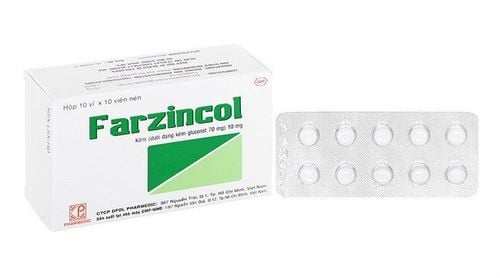This is an automatically translated article.
Functional foods are products that are currently being advertised a lot on the market with a variety of forms and different uses. Therefore, the question that many people ask is whether to take functional foods and how to use them properly?
1. What are functional foods?
Functional foods are defined as products that synthesize substances including vitamins, minerals, amino acids, extracts from plants and animals. They are prepared in the form of complete tablets, capsules, nuggets, pills, liquids, powders and some other forms with the effect of supplementing essential nutrients for the body or reducing the risk of disease.
Although the product shape is similar to western medicine, functional foods do not have the purpose of treating or preventing disease. In order to be licensed for circulation on the market, functional foods must declare their health-supportive effects as well as their safety, effectiveness and side effects on the user's body.
Using functional foods is not the first choice for nutritional supplements, but instead you should prioritize a diet full of natural foods for a healthy body.

Khi nào nên bổ sung thực phẩm chức năng?
2. Some notes when using functional foods
2.1. Not necessary to use when the body is healthy According to medical experts, when you do not have any health problems, drugs or functional foods are not something you should use. This is explained because functional foods are also drugs, so they also have a small impact on the body. Especially for people with underlying medical conditions such as heart disease, obesity or diabetes, they need to be very careful because it can affect their current condition.
2.2. Carefully weigh the benefits and risks Before using any functional food, you should also carefully weigh the benefits and risks for your body. Please note that, no matter how good any drug is, it cannot replace the fact that you supplement it through food with a reasonable, scientific diet.
2.3. Start using a low dose When starting to use functional foods, you should start with a low dose to let your body adapt gradually, and at the same time have slow and gradual effects. In addition, starting at a low dose also reduces the risk of irritable bowel syndrome.
For multivitamins, you should approach children's dosages to ensure safety for health. Especially for some imported functional foods, the recommended dose is calculated by the dose of children to ensure safety.

Không cần dùng thực phẩm chức năng nếu bạn hoàn toàn khỏe mạnh
2.4. Do not use for a long time Scientists have researched and said that functional foods and supplements should be used with the lowest dose in the shortest time. This principle will ensure that the user does not become too dependent on the drug or become addicted to the supplements. Instead, they can focus on lifestyle changes, dietary changes to ensure adequate supply of nutrients needed by the body.
In addition, there are some drugs that are prescribed by doctors to prevent cancer recurrence or treat disease, which need to be followed in accordance with the given schedule.
2.5. The price is not quite synchronized with the quality. Most of the supplements and functional foods are sold on the market at high prices and are patented. However, paying a lot of money for a supplement is not necessarily better than products with similar active ingredients but cheaper.
2.6. Read carefully when buying instructions When considering any drug or food, you need to read the packaging and instructions for use carefully. The manufacturer will guide very carefully about the recommendations when using such as whether the drug can be used by patients with cardiovascular disease, diabetes, pregnant women or children.
In addition, it is necessary to ensure that functional foods do not contain:
Phthalates; Colours, flavourings, sugars and artificial sweeteners; Gluten, hormones, lactose; Pesticides or herbicides; Preservatives, yeast, allergens (such as soy, peanuts, tree nuts...); No heavy metals such as arsenic, cadmium, lead, mercury. 2.7. Blood test For some cases, the patient needs to perform a blood test to determine the trace elements that the body is lacking such as potassium, magnesium, iron, vitamin B12. However, after using functional foods, blood tests do not seem to be accurate. Therefore, blood test after using functional foods is not necessary.

Hãy xem xét kỹ trước khi sử dụng thực phẩm chức năng trong lúc mang thai
2.8. When to drink functional foods? Supplements are often added during or after a meal and a few are used at that time.
Many people also wonder if functional foods can be taken together? However, according to nutritionists, the most common side effect of users is digestive disorders, so it is best to take it at mealtime or after meals to ensure gastric juice and food are absorbed. best absorbed by the body.
2.9. There is a link between the doctor and the pharmacist The doctor will usually be the prescriber and the pharmacist has a role in advising the patient to take the medicine. However, many people often buy their own medicine and only ask the pharmacist for information about the drug. The reality is that with any medication, both a doctor and a pharmacist should be consulted. Because only the doctor is the one who examines and understands the patient's health problems to know the indications as well as contraindications. The pharmacist will guide the patient to use the medicine safely. Therefore, this cooperation is extremely necessary.
2.10. Possible reactions when using an overdose of functional foods Many people like to use supplements and functional foods because they think they are less harmful than western drugs. But in fact, it is also a form of medicine and when taken into the body, it can also cause adverse reactions or damage organs such as liver, kidney, heart,... If over 200mcg of selenium is used per day, Days may increase the risk of type 2 diabetes, prostate cancer, skin cancer recurrence, and are not beneficial for heart health.
In addition, there are a number of harmful effects if using an overdose of ingredients in functional foods, including:
An overdose of vitamin A leads to liver toxicity; Overdose of calcium, vitamin C, vitamin D causes kidney stones; An overdose of 5-HTP or St John's wort causes nausea; Vitamin B6 overdose causes peripheral neuropathy; An overdose of fish oil causes gastrointestinal upset and an increase in bad cholesterol (LDL); Zinc overdose causes loss of taste and smell; Iron overdose causes constipation; Magnesium overdose causes diarrhea; Iodine overdose causes thyroid problems. Although the product's shape is similar to that of western drugs, functional foods are not intended to treat or prevent disease. Therefore, functional foods should not be used as the first choice to supplement nutrition. Instead, you should prioritize a diet full of natural foods for a healthy body.
Please dial HOTLINE for more information or register for an appointment HERE. Download MyVinmec app to make appointments faster and to manage your bookings easily.
Reference source: webmd.com













